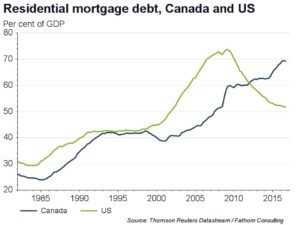A sideways look at economics
It may only be Thursday, but with a four-day weekend starting tomorrow, it is appropriate that we send our weekly TFiF publication today: Thank Fathom it’s a Four-day weekend (TFiFdw).
The US military strike on a Syrian airbase may have dominated the headlines this week, but economists are still wondering just how Donald Trump will narrow the US trade deficit. Donald Trump’s meeting with Xi Jinping passed smoothly. China is not a currency manipulator. There has also been a softer tone towards Mexico recently too.
Could Canada get the blame?
Times have changed
The deficit’s getting worse
Other countries are taking advantage of us
These trade deals really hurt
Should we blame the government?
Or blame society?
Or should we put all the blame on President Xi?
No! Blame Canada, blame Canada
It seems that everything’s gone wrong
since NAFTA came along
Blame Canada, blame Canada.
With all their hockey hullabaloo
And Justin Trudeau – he’s way too cool!
Blame Canada, blame Canada
For their low corporate tax rate
That makes our businesses irate
Blame Canada, blame Canada
They keep on sending us their oil
And making our frackers toil
Blame Canada, blame Canada
That was an edited version of the song, Blame Canada, from the popular US television series South Park, which jokingly blames Canada for the many ills afflicting US society.
But blaming Canada for the US trade deficit? Surely just as absurd. That may be so but Canadian policymakers are taking the threat of US protectionism seriously. Indeed, only yesterday the Bank of Canada Governor Stephen Poloz warned that “a notable increase in global protectionism remains the most important source of uncertainty facing the Canadian economy”. With three quarters of Canada’s exports destined for the US, it is not surprising that Mr Poloz is concerned.
But although Canada is the third largest exporter to the US, it is the largest recipient of US exports. The US may have a goods deficit in trade with Canada, but nearly all of this can be explained by crude oil. Add services into the mix and the trade deficit becomes a surplus. This is just one of the reasons behind our belief that the US will not impose border adjustment tariffs on trade with Canada.
Canada’s demons are closer to home.
A recent report showed that house prices in Toronto jumped by 33% in the year to March, facilitated by households taking on ever more debt. Unlike the US, which went through a painful recession when its housing bubble burst, Canada has delayed the pain.
Blame the Bank of Canada, blame the Bank of Canada?

